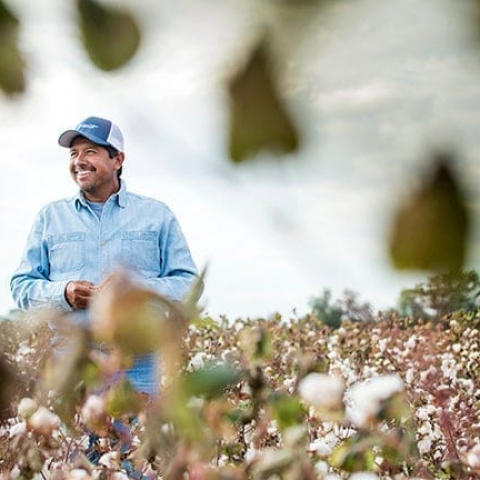Beginning farmers are often lumped together and treated as a homogeneous group when, in fact, they are quite diverse, especially when it comes to their credit needs.
On November 9, 2020, Farm Credit representatives shared their perspectives during a conference titled “Emerging Research on Beginning Farmers and Ranchers.”
The conference was an offshoot of the Beginning Farmers and Ranchers project, a joint effort between Farm Foundation, USDA and the USDA’s Economic Research Service (ERS) to examine issues that either hinder or facilitate the entry of beginning farmers and ranchers into the agricultural sector, as well as the factors that lead to their success or failure.
Farm Credit Perspectives
As part of the conference, Gary Matteson, Vice President Beginning Farmer Programs and Outreach at the Farm Credit Council moderated a panel on agricultural credit titled, “Ground-Truthing the Beginning Farmer Experience with Credit.”
The discussion featured three Farm Credit staff who work directly with beginning farmers:
- Samantha Stoddard, Senior Loan Officer at Farm Credit East
- Raechel Sattazahn, Knowledge Center Director at Horizon Farm Credit
- Terry Hinds, Chief Asset Quality and Assurance Officer at Compeer Financial
A foundation in the Ag Census
Gary kicked off the panel by sharing that 30% of all farms in the US have a beginning farmer on their management team, according to the 2017 Ag Census.
However, contrary to common assumption, not all beginning farmers are young. Gary speculated that there are more beginning farmers who are older due to the recent trend for farm ownership transitions occurring later in life. For example, a son or daughter could leave the farm after college for a career in agribusiness and return to the farm management team as an “early retirement” strategy from their non-farming career at age 40.
This broad range in the age of beginning farmers is one reason why their credit needs vary so dramatically. We can reasonably assume that the credit needs of a 65-year-old beginning farmer who has worked an off-farm job for 40+ years are likely different than the credit needs of a 25-year-old beginning farmer who is just beginning their career.
Another important distinction when considering the needs of beginning farmers is the size of their farm. This session used farm sales size as the basis for segmenting farms into three categories: part-time/hobby farm; intermediate income generator farm; and commercial ag production. These categories illuminate how much income the farm business operator expects their enterprise to contribute to their family’s income; an important piece of information to understand a particular beginning farmer’s credit needs.
Ground-truthing the data
While farmer demographics and farm income expectation categories provide a strong theoretical model from which to understand beginning farmers’ credit needs, Raechel, Samantha and Terry, the three Farm Credit panelists, called upon their day-to-day experiences working with beginning farmers to provide insight into the diversity of beginning farmers as individuals and as farm business operations.
Raechel, Samantha and Terry described how difficult (but not impossible) it is for beginning farmers to start any type of commercial-scale ag operation due to the typically large investment required. The panelists each expected a slight percentage of their smallest farm business start-up customers to grow into mid-then commercial-scale farm enterprises. In their experience, it was much more common for beginning farmers to start an operation, grow it to a particular size that fit with other lifestyle parameters, and then continue to operate that “right-sized” business for many years.
When asked if farming could continue to attract new entrants, Raechel, Samantha, and Terry each told of the passion they see in young people to become beginning farmers. The essential condition necessary to turn that passion into farm business creation is the ability to see profitability and a path to business growth. Interestingly, each of the panelists came from a commercial farm background, but for different reasons chose not to enter their family business. Their formative farming experiences have enabled them to be particularly effective as they work with all types of beginning farmers.
The panelists’ comments called attention to the potential policy hazards of lumping a disparate group of people into the convenient term of “beginning farmer,” and instead, the need to acknowledge the diversity among beginning farmers and their credit needs.
Farm Credit is committed to beginning farmers
Farm Credit institutions across the country are dedicated to serving the needs of beginning farmers and ranchers; it is a critical component of our mission. We engage across the spectrum of demographics and farm income expectation categories, whether they are focused on conventional, organic, sustainable, local food-related operations, direct-to-retail or other emerging business models.
Every local Farm Credit institution is sensitive and responsive to the needs of young, beginning and small (YBS) farmers and has a dedicated program for them. Examples of YBS programs include training and seminars on topics such as intergenerational transfer of family farms, risk management techniques, financial skills training and establishing effective business plans.
Need to catch up?
For those who missed the conference and/or the panel discussion, Farm Foundation will upload session recordings to the Farm Foundation YouTube channel over the coming weeks, where they will live in perpetuity. You may view presenter slide decks from the presentations, as well as the resources shared in the USDA networking booths, on the Farm Foundation website. For more information about the event and to view the agenda and speakers’ bios, visit the conference website.
Craving more?
As a follow-up to this conference, Farm Foundation and Farm Credit are pleased to host Training for Success: Resources and Tools for Working with Beginning Farmers and Ranchers. This free, two-day virtual conference will build upon the past few days’ learnings by providing a practitioner-focused program highlighting resources, tools and success stories for supporting beginning farmers and ranchers. Registration is now open!
